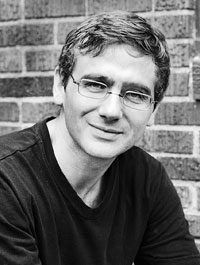 The University of Minnesota College of Liberal Arts has named Bruno Chaouat as the new director of the Center for Holocaust and Genocide Studies. Chaouat (ôshow-AHTö), an associate professor in French, has been at the University of Minnesota since 2002. His academic research addresses, among other topics, post-Holocaust art and literature. He has written essays in French and in English on the current debates about the representation of the Holocaust in visual arts. His work also examines the ideological, political and philosophical challenges faced by Jews in France. He focuses on the polemics of the new anti-Semitism in relation to the current Middle East conflict.
The University of Minnesota College of Liberal Arts has named Bruno Chaouat as the new director of the Center for Holocaust and Genocide Studies. Chaouat (ôshow-AHTö), an associate professor in French, has been at the University of Minnesota since 2002. His academic research addresses, among other topics, post-Holocaust art and literature. He has written essays in French and in English on the current debates about the representation of the Holocaust in visual arts. His work also examines the ideological, political and philosophical challenges faced by Jews in France. He focuses on the polemics of the new anti-Semitism in relation to the current Middle East conflict.Chaouat assumed the directorship on July 1, and has already begun putting together a lecture series for 2010-11 that will address "Alternative Narrativesùor Denial?" Two speakers in that series will include Professor Henry Rousso (CNRS, Institut d'Histoire du temps present, Paris) and Professor Jeffrey Mehlman (Boston University), who will both speak in spring 2011.
Plans are also being finalized to bring to Minneapolis the filmmaker Michael Prazan, who will present his film "Einsatzgruppen: the Death Brigades," considered the most important documentary to date on the Holocaust by bullets (Eastern Europe), this November. Chaouat is also building a partnership with Universite de Paris VII-Diderot, whose Department of Sciences Humaines Cliniques has a highly regarded program on trauma, genocide and psychoanalysis.
"I am very pleased that we are able to appoint a director who has Bruno's long-time experience on both the Center for Holocaust and Genocide Studies and Center for Jewish Studies advisory boards," says James A. Parente, Jr., dean of the College of Liberal Arts. "His deep involvement with CHGS will lend itself to extending the legacy of founding director Stephen Feinstein, and his background in the humanities will bring many innovative directions to the center's research, teaching, and outreach missions."